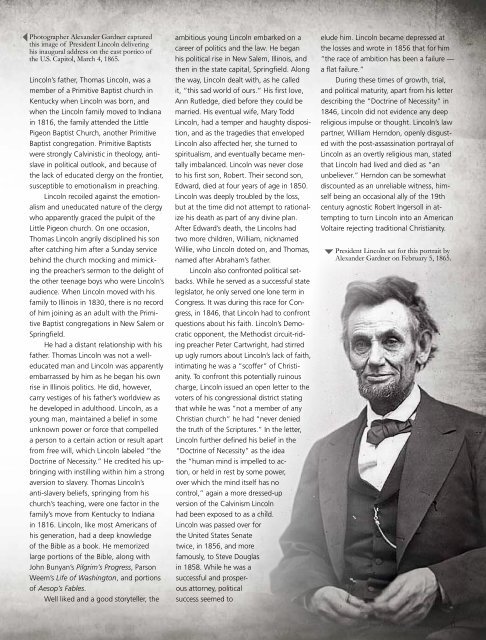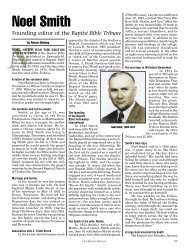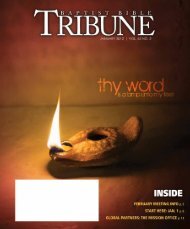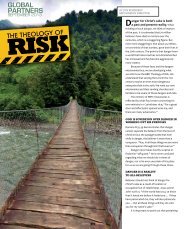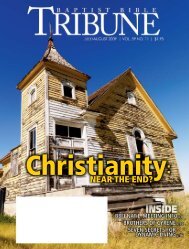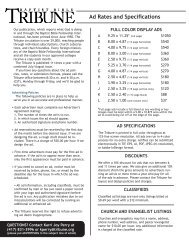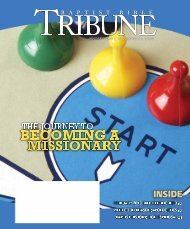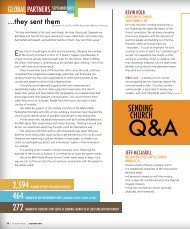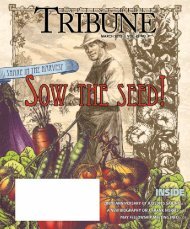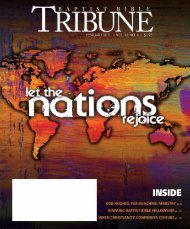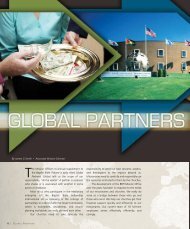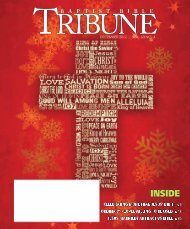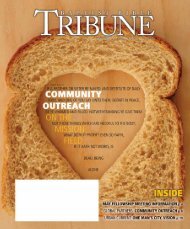Pastor of my dreams - Baptist Bible Tribune
Pastor of my dreams - Baptist Bible Tribune
Pastor of my dreams - Baptist Bible Tribune
Create successful ePaper yourself
Turn your PDF publications into a flip-book with our unique Google optimized e-Paper software.
Photographer Alexander Gardner capturedthis image <strong>of</strong> President Lincoln deliveringhis inaugural address on the east portico <strong>of</strong>the U.S. Capitol, March 4, 1865.Lincoln’s father, Thomas Lincoln, was amember <strong>of</strong> a Primitive <strong>Baptist</strong> church inKentucky when Lincoln was born, andwhen the Lincoln family moved to Indianain 1816, the family attended the LittlePigeon <strong>Baptist</strong> Church, another Primitive<strong>Baptist</strong> congregation. Primitive <strong>Baptist</strong>swere strongly Calvinistic in theology, antislavein political outlook, and because <strong>of</strong>the lack <strong>of</strong> educated clergy on the frontier,susceptible to emotionalism in preaching.Lincoln recoiled against the emotionalismand uneducated nature <strong>of</strong> the clergywho apparently graced the pulpit <strong>of</strong> theLittle Pigeon church. On one occasion,Thomas Lincoln angrily disciplined his sonafter catching him after a Sunday servicebehind the church mocking and mimickingthe preacher’s sermon to the delight <strong>of</strong>the other teenage boys who were Lincoln’saudience. When Lincoln moved with hisfamily to Illinois in 1830, there is no record<strong>of</strong> him joining as an adult with the Primitive<strong>Baptist</strong> congregations in New Salem orSpringfield.He had a distant relationship with hisfather. Thomas Lincoln was not a welleducatedman and Lincoln was apparentlyembarrassed by him as he began his ownrise in Illinois politics. He did, however,carry vestiges <strong>of</strong> his father’s worldview ashe developed in adulthood. Lincoln, as ayoung man, maintained a belief in someunknown power or force that compelleda person to a certain action or result apartfrom free will, which Lincoln labeled “theDoctrine <strong>of</strong> Necessity.” He credited his upbringingwith instilling within him a strongaversion to slavery. Thomas Lincoln’santi-slavery beliefs, springing from hischurch’s teaching, were one factor in thefamily’s move from Kentucky to Indianain 1816. Lincoln, like most Americans <strong>of</strong>his generation, had a deep knowledge<strong>of</strong> the <strong>Bible</strong> as a book. He memorizedlarge portions <strong>of</strong> the <strong>Bible</strong>, along withJohn Bunyan’s Pilgrim’s Progress, ParsonWeem’s Life <strong>of</strong> Washington, and portions<strong>of</strong> Aesop’s Fables.Well liked and a good storyteller, theambitious young Lincoln embarked on acareer <strong>of</strong> politics and the law. He beganhis political rise in New Salem, Illinois, andthen in the state capital, Springfield. Alongthe way, Lincoln dealt with, as he calledit, “this sad world <strong>of</strong> ours.” His first love,Ann Rutledge, died before they could bemarried. His eventual wife, Mary ToddLincoln, had a temper and haughty disposition,and as the tragedies that envelopedLincoln also affected her, she turned tospiritualism, and eventually became mentallyimbalanced. Lincoln was never closeto his first son, Robert. Their second son,Edward, died at four years <strong>of</strong> age in 1850.Lincoln was deeply troubled by the loss,but at the time did not attempt to rationalizehis death as part <strong>of</strong> any divine plan.After Edward’s death, the Lincolns hadtwo more children, William, nicknamedWillie, who Lincoln doted on, and Thomas,named after Abraham’s father.Lincoln also confronted political setbacks.While he served as a successful statelegislator, he only served one lone term inCongress. It was during this race for Congress,in 1846, that Lincoln had to confrontquestions about his faith. Lincoln’s Democraticopponent, the Methodist circuit-ridingpreacher Peter Cartwright, had stirredup ugly rumors about Lincoln’s lack <strong>of</strong> faith,intimating he was a “sc<strong>of</strong>fer” <strong>of</strong> Christianity.To confront this potentially ruinouscharge, Lincoln issued an open letter to thevoters <strong>of</strong> his congressional district statingthat while he was “not a member <strong>of</strong> anyChristian church” he had “never deniedthe truth <strong>of</strong> the Scriptures.” In the letter,Lincoln further defined his belief in the“Doctrine <strong>of</strong> Necessity” as the ideathe “human mind is impelled to action,or held in rest by some power,over which the mind itself has nocontrol,” again a more dressed-upversion <strong>of</strong> the Calvinism Lincolnhad been exposed to as a child.Lincoln was passed over forthe United States Senatetwice, in 1856, and morefamously, to Steve Douglasin 1858. While he was asuccessful and prosperousattorney, politicalsuccess seemed toelude him. Lincoln became depressed atthe losses and wrote in 1856 that for him“the race <strong>of</strong> ambition has been a failure —a flat failure.”During these times <strong>of</strong> growth, trial,and political maturity, apart from his letterdescribing the “Doctrine <strong>of</strong> Necessity” in1846, Lincoln did not evidence any deepreligious impulse or thought. Lincoln’s lawpartner, William Herndon, openly disgustedwith the post-assassination portrayal <strong>of</strong>Lincoln as an overtly religious man, statedthat Lincoln had lived and died as “anunbeliever.” Herndon can be somewhatdiscounted as an unreliable witness, himselfbeing an occasional ally <strong>of</strong> the 19thcentury agnostic Robert Ingersoll in attemptingto turn Lincoln into an AmericanVoltaire rejecting traditional Christianity.President Lincoln sat for this portrait byAlexander Gardner on February 5, 1865.<strong>Baptist</strong> <strong>Bible</strong> <strong>Tribune</strong> [ February 2009 ] 11


